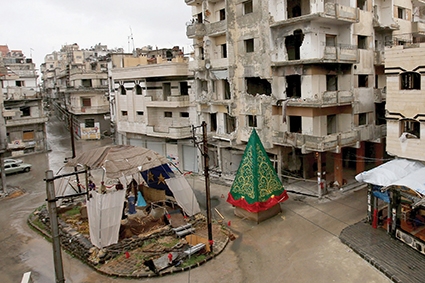Doing Things Differently: Ogden on Syria & The Long-Term
That 2016 has been the worst year of all time might well be disputed by those who lived through the Black Death and both World Wars, but there has been something to upset everyone this year; a real pick ‘n mix of tragedy, which brought out the best and worst in people. Some were upset by the deaths of beloved celebrities, while others wept over images of the Syrian war, with their friends panicking over the consequences of Brexit and the election of Donald Trump.
For my part, I cannot really care overmuch about the deaths of celebrities. I will confess to being quite shocked by Carrie Fisher’s sudden passing, although in truth I was more concerned as to how they will now tie in her death to the Star Wars sequels. I am not blessed with the talent to cry over someone I never knew, no matter how much I appreciated their work, and in truth I never cared for the music of David Bowie. Cold? Perhaps so by today’s standards, but I’ll save my sorrow for those close to me, and if every famous man’s death diminishes me, I’d say it diminishes him a damn sight more. Besides which, even if the celebrity lifespan now seems to be twenty years fewer than that of the average man, I’d say their opulent lifestyles and millions in the bank make up for it rather.
Nor can I share in the despair over Donald Trump and Brexit. Despite the fact that both will lead to unpredictable and terrifying consequences, they are also the result of long-term political failures that could have been avoided had political correctness and pandering been replaced by common sense and earnestness. Many times over the last few years I have debated terrorism with millennial pseudo-intellectuals, only to be met with the same patronizing smile and titter of ‘Well, have you ever thought why the perpetrators of these terrible things might feel as they do?’, yet these same people are incapable of applying the same logic to their own kind. Rather than explore why people might vote for Donald Trump, they prefer to sweep uncomfortable issues aside with knockout-blow accusations such as ‘racist’ or ‘intolerant’.
It is Syria that I felt strongest about, not only because the people who have suffered (and are suffering) as a result of the conflict have never had Rickman and Bowie’s millions, and are lumped into a faceless mass of ‘poor down-trodden migrants’ or ‘fifth column invaders’ depending on your perspective. Syria is the most tragic because the solution was also simple…simple, but not easy.
I feel as sorry for those fleeing Syria as far as anyone can, but opening the doors of Europe has not worked. Had the borders remained closed, a wave of terrorist attacks, horrific sexual assaults and violent crimes would never have happened; denying that fact amounts to nothing less than wilful ignorance. After all, a perpetrator cannot commit a crime if he never reaches the crime scene. A simple point simply made, you might think, and I agree; however, I have encountered resistance to the statement of even the most obvious of facts in recent times. The influx of refugees has also only fuelled support for the likes of Donald Trump, an outcome that was entirely predictable.
What, then, would I have done differently? How to prevent the EU from internal fighting thanks to the horde of refugees within its borders, some of whom are openly hostile to Western values? How to mollify the right? How to help the people of Syria and appease the left? How to show Russia that it cannot act with impunity?
The answer is simple, but purely hypothetical; it is much too late for this, and it would have required the kind of political courage common to the 1940s but rarely found now.
Of course, the West was never going to launch a full-scale military campaign in Syria after the unpopular debacles of Afghanistan and Iraq, but doing so could have stabilized the situation to the extent that even if refugees had made their way to Europe, their numbers would have been far fewer. Perhaps a Cold War-style buffer zone between Russian-backed Assad’s territory and Western areas of control could have been established; difficult, perhaps, but preferable to the split of the EU and the election of Donald Trump, one of which is imminent while the other remains a possibility.
Political sparring with Russia is always difficult, and Western powers have been (understandably) reluctant to provoke Moscow’s wrath, especially as a counter show of force might lead to an escalation rather than the Kremlin backing down. However, after Georgia and Ukraine, to say nothing of the snatching of an Estonian security agent from Estonian territory and the frequent airspace violations, one might have thought it time the West realized confronting Russia is a matter of when rather than if. Yet it is possible (although admittedly unlikely) that the Russians could have been cooperated with, at least to some degree.
Active humanitarian aid and a military campaign against extremist Islamist groups would likely cost the West more than either Afghanistan or Iraq, as well as burden it with having to govern parts of Syria, which, with its previous meddling in the Middle East it simply does not have the stomach to do. But as awful as the results might have been for a campaign of that magnitude, I wonder if they would have had the same damaging long-term ramifications as recent events surely will.
Christmas spirit in Syria. Youssef Karwashan/AFP/Getty
Tim Ogden












